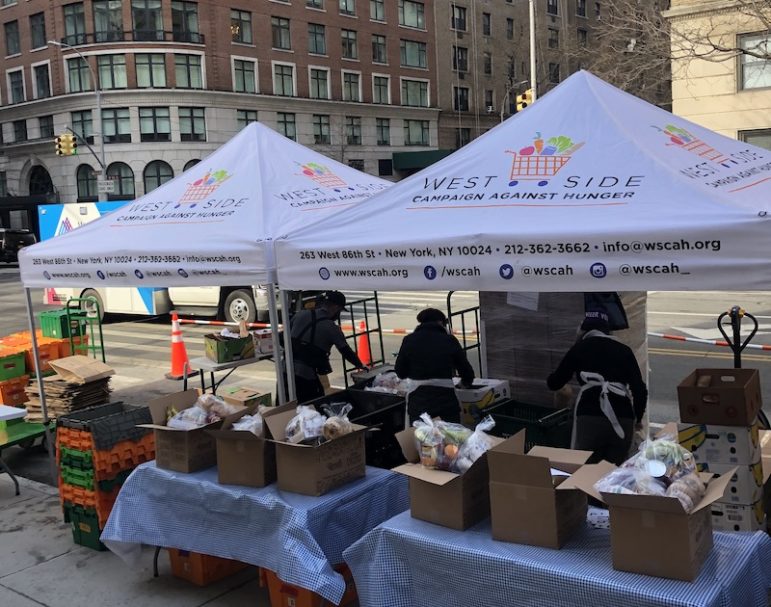As grocery workers and restaurant staff got the shot, nonprofit food providers wondered when their workers will get protected. The answer came on March 1: soon.

West Side Campaign Against Hunger
Workers at the West Side Campaign Against Hunger on the job.Updated at 8:40 a.m.
Pedro Aguilar was doing on Dec. 11 what workers at the West Side Campaign Against Hunger have been doing for 41 years—getting food to New Yorkers who need it. Based in a church basement for much of its history, the organization moved its operation to the street, where the need was, when the pandemic struck. It operated “mobile market sites” across four boroughs. And a few weeks before Christmas, it responded to a request by Rep. Jerrold Nadler to deliver food to NYCHA’s Amsterdam Houses. That’s what Aguilar was doing when he was hit by a bullet that a drive-by shooter apparently intended for someone else.
Aguilar survived and is recovering slowly. But for several weeks, his colleagues at the Campaign faced a health threat of their own, from COVID-19, without the protection of the vaccine. While grocery workers and restaurant workers were given priority for immunization, their counterparts in the nonprofit world working in soup kitchens and food pantries were not, despite months of advocates’ efforts.
“It might be crass to say, but it’s like, our staff can get shot at, but can’t get the vaccine shot,” Chef Greg Silverman, the CEO and executive director of the West Side Campaign, tells City Limits.
That changed Monday, when the state Department of Health issued revised guidelines that included “regional food banks, food
pantries, and permitted home-delivered meal programs” on the vaccine priority list.
Gov. Andrew Cuomo had added public-facing grocery workers to the vaccine priority list on Jan. 11. Joel Berg, the CEO of Hunger Free America, says he and other leaders in the nonprofit food sector, along with elected officials like State Sen. Liz Krueger and City Councilmember Mark Levine, then asked for people who work at charitable food pantries, food banks, soup kitchens, meals on wheels programs, and hunger outreach organizations to be included.
After initially dismissing demands for restaurant workers to get the shot, Cuomo relented in early February. “We again asked for nonprofit food workers to be included but were again blown off. Normally, the governor’s office has been very responsive to requests from me and other leaders in our sector, so the non-responsiveness on this realty stands out,” Berg says. “Cuomo’s office has placed workers at for profit food businesses on the vaccine list but has steadfastly refused to do so for workers at nonprofit food distribution/anti-hunger organizations.”
Last week, City Limits asked the state Department of Health what the plans were for vaccinating what Silverman estimates is at most 10,000 charitable food workers throughout the state. “We are working our way through our current universe of eligible New Yorkers and are examining next steps in the event that federal vaccine supply increases,” Samantha Fuld, a DOH spokesperson, replied on Thursday.
Like other emergency food providers, the West Side Campaign receives money from the Cuomo administration’s Nourish program, which elegantly supports New York State farmers while getting fresh produce to hungry people. Silverman thought it odd that the state was funding that work but not moving to protect the people doing it.
“We’re being asked by the state to feed hungry people and given money to do that. So on some level we’re essential,” he says, “but at the same time we aren’t being given the opportunity to have our staff vaccinated as we’re doing those efforts.” He estimates West Side will serve more than 50,000 people this year.
Neither Berg nor Silverman were calling for nonprofit food workers to get preference over any of the groups already in the priority vaccine line. They just wanted to be put somewhere on the preference list so they can start getting in line.
On Monday morning, in light of the revised vaccine guidelines, Berg told City Limits: “We are pleased that most nonprofit food workers are now eligible once the vaccines are available.”









